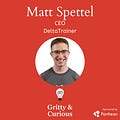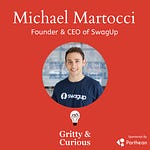This past week, we’ve gained 19 new subscribers to the newsletter. Welcome to the Gritty & Curious Family! If you’re reading this but haven’t subscribed or know friends who would enjoy this newsletter, be sure to subscribe below or share it with your friends.
Happy Monday! 👋
Some quick news from Gritty & Curious HQ:
We officially launched our Gritty & Curious Community on Parthean. The purpose of this community is to create a space for ambitious self-starters to share ideas, give feedback, and provide mentorship. If you are interested in joining check it out here.
Gritty & Curious started recording for our second podcast, Gritty & Curious Founder’s Journal, where Austin and I will share the most interesting thoughts we’ve had throughout the week as well as discuss the journey of building Gritty & Curious.
Gritty & Curious launched its merch shop! Get your G&C merch while supplies last.
Now that we got those updates out of the way… let me introduce this week’s podcast guest, Matt Spettel, CEO & Co-Founder of DeltaTrainer.
So what is DeltaTrainer?
Well, I’m glad you asked. Matt and his team at DeltaTrainer are working on revolutionizing the personal training/fitness industry by using wearable tech to provide real-time feedback during each set/rep of a workout. With just an Apple Watch, DeltaTrainer will automatically be able to:
Track your Reps/Sets
Fix bad form
Measure difficulty in completion of sets
… and more.
We were blown away by this technology so we decided to bring Matt onto the podcast to talk about DeltaTrainer and what it took to build this company.
In this episode, Austin and Matt have a conversation about:
The evolution of the fitness industry
Data analytics, data mining, and testing
Advice for aspiring creators
Take a listen below or in the audio player above!


As always, we have provided Podcast Highlights below with the key takeaways from the podcast (we are planning on switching things up next week by providing only key timestamps of the podcast. If you found the Podcast Highlights valuable, let us know and we might bring it back in a future iteration).

Podcast Highlights
On the Idea for DeltaTrainer (1:10)
During a lunch break, Matt Spettel and his childhood best friend Gabe Madonna came up with the idea of using wearable devices to track and detect sets/reps (an automatic logger).
How does DeltaTrainer Technology work? (2:34)
DeltaTrainer tracks the raw inertial data of any exercise through a smartwatch (3 axis of accelerometer data, 3 axis of gyroscope data, 3 axis of orientation with respect to gravity).
Next, DeltaTrainer collects the data for thousands of iterations of a specific exercise in order to increase the accuracy of exercise detection.
It then funnels the data through modern machine learning approaches in order to discern the reps, type of exercise, the difficulty of each exercise, whether the exercise had good form, and many more cool metrics.
What is the process of collecting data for exercises? (7:56)
Initially, Matt and Gabe collected the data by performing thousands of reps themselves by working out. But as the company developed, new exercise data is collected every time a user performs a rep/exercise which means each rep increases the accuracy of the product.
DeltaTrainer also hires contractors to collect data for them, which is essentially getting paid to work out. Pretty sweet gig.
Currently, DeltaTrainer has over 500 exercises and are working on much more.
DeltaTrainer is meant to be used in tandem with a personal trainer. How does that work? (10:55)
The trainer will put in the programming for the client and the DeltaTrainer app will be used to guide the client through the exercises by counting sets/reps and giving warning/tips on bad exercise form.
Key Quote: "The trainer's main function is to let you know what to do and help you have the motivation while the app is there to do the heavy lifting-- no pun intended"
What is the Future of Fitness? (18:30)
Fitness is going to go from:
Broadcast model (e.g. peleton) - one trainer broadcasting to 30+ people
Feedback Model (e.g. DeltaTrainer, Mirror, Tempo ) - real-time response to the actions of a person via wearable tech or computer vision.
The broadcast model is useful in providing content but what it lacks is connection and real-time feedback when scaled.
DeltaTrainer has been able to scale trainers up to hundreds of clients, whereas in person, they were training 20.
Key Quote: "The next level of digitized fitness is where you not only get the content of a celebrity trainer but you also get the same effect as if the celebrity trainer was standing there right next to you, coaching you through those movements."
Why Apple Watch as the company's wearable of choice to track exercise? (28:07)
Originally, Matt created his own wearable and it looked like a "hackathon project with some polish"
After talking to a mentor, he realizes that the Apple Watch was 1) already made 2) had an order of magnitude greater market penetration (~15%).
On Target Market (30:51)
Trainers:
a) who are looking to embrace remote and want to scale clients from just 20 in-person people
b) are influencer-broadcast types who can be introduced to the feedback model
c) trainers who are not satisfied with remote-coaching to be just email and pdf guides.
End-users: Busy professionals who want a good workout plan and a personal trainer but want flexibility as well.
On the journey/growth of DeltaTrainer since its inception (37:05)
DeltaTrainer started off as a side-project between Matt and Gabe during their junior year. As students, however, their main priority was school. But come spring semester, they started to gain significant interest from investors and advisors at their respective universities which shifted their mindset to take DeltaTrainer seriously.
Soon afterward, Matt and Gabe signed up for a swath of business competitions and placed very well, giving them the opportunity to be accepted into a summer Carnegie Mellon accelerator program in Silicon Valley. From here, DeltaTrainer was able to receive some initial investment money from Matt Rogers -- one of their previous mentors turned investors and founder of Nest. During this summer, they worked really hard to create a product into paying user hands because up until that point it was just a lot of beta testing and testing for market fit.
Coming out of the summer, Matt began to focus on getting users on the platform while Gabe focused on building out the tech.
This January, DeltaTrainer raised a good chunk of pre-seed money after seeing really strong growth in the platform and will be moving into an office post-COVID.
Advice for someone with an idea but unsure of next steps (52:51)
With DeltaTrainer, Matt and Gabe were unsure about a lot of details -- what they were building, how they were going to build it-- but throughout the entire process, they had confidence in themselves in creating a fitness technology to improve people's workouts.
A lot of times, student entrepreneurs, when they hit their first stumbling block just give up. They have a "unique kernel of an idea, but they don't have the right mindset or confidence to foster it through".
The key is to be able to withstand all of the troubles and tribulations of the pivoting process and finding your value proposition.
If you are apart of a university, there will be most likely be an entrepreneurship program, and it's helpful to get to know the people and become their friends. During the initial year, there will be a lot of company shaking events, and being able to call these people for advice was very important to keep the company moving in the right direction.
Key Quote: "It's a combination of confidence and surrounding yourself with very smart, helpful people"
Matt has done a lot of projects over the years (just take a look at his LinkedIn). What has he learned? (1:00:03)
You need to be passionate about what you're doing to sustain in the long-run: In senior year of AP Chemistry, Matt built a pumping system that measured chemicals and did dilutions automatically. He was ultimately able to sell the product out to chemistry labs and teachers but did not see a future in continuing to build out this product because he wasn't passionate about pumping systems -- although customer demand was there.
Other people also have to be interested in your project to sustain in the long-run: Matt's second company, InvenTower, solved the pain point of organizing electronic parts, but the product was too niche. While he was passionate about this product, he realized others needed to be interested too for it to be profitable.
Build things you are proud of. Matt's built a lot of things over the years-- some profitable, some not. But no matter what, he's always been proud of whatever he built. Build things you're proud of.
What does it mean to be Gritty & Curious? (1:00:19)
Gritty - Just go do it and don't give up when things change course
Curious - Being introspective about the problems you have in your life because that's where the most passionate ideas come from.
If you want a copy of these notes in Notion, click here.
Thanks for reading! We’ll see you next week and as always…
Stay 💪 & 💡,
Austin & Andy













Gritty & Curious #26 - Matt Spettel, CEO & Co-Founder of DeltaTrainer